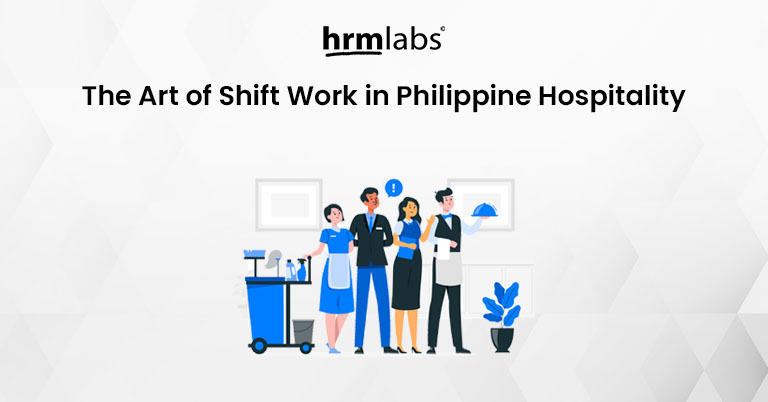Working in a hospitality industry in the Philippines is no easy feat. With guests coming and going at all hours, managing staff attendance and schedules can feel like juggling flaming torches. From dealing with fluctuating work hours to handling shift swaps and staying on top of labor laws, it’s a lot to manage.
Fortunately, advanced HR and payroll systems are here to make life a whole lot easier. Let’s dive into some common challenges and see how modern HR tech can help smooth out the bumps.
The Complexities of Hospitality Scheduling
Shift work in hospitality is characterized by its irregularity and often unpredictable nature. Factors such as seasonal fluctuations, customer demand, and event schedules necessitate constant adjustments to staffing levels. This dynamic environment makes traditional time and attendance management methods inefficient and prone to errors.
Fluctuating Work Hours
One of the most significant challenges in the hospitality industry is managing fluctuating work hours. The nature of the business means that demand can vary greatly depending on the time of year, holidays, and special events. Predicting and adjusting staffing levels to match these fluctuations is a daunting task. Understaffing during peak periods can lead to poor service quality, while overstaffing during slow times can result in unnecessary labor costs.
Shift Swaps and Employee Availability
Employee availability is another critical issue. Many hospitality staff have part-time schedules, second jobs, or personal commitments that affect their availability. Managing these preferences while ensuring adequate coverage can be a logistical nightmare, especially when dealing with last-minute schedule changes or shift swaps. This can lead to employee burnout and dissatisfaction.
Adherence to Labor Laws
Compliance with labor laws is another significant challenge. The Philippines has strict regulations regarding minimum wage requirements, overtime rules, and break time regulations. Ensuring that hotel staff schedules adhere to these legal requirements while balancing operational needs is a complex task. Non-compliance can result in fines and damage to the hotel’s reputation.
Overcoming Challenges with Advanced HRMS
To navigate these complexities, hospitality businesses need a robust HR and payroll system that can handle the unique demands of the industry. An advanced HRMS like HRMLabs offers several key benefits:
- Automated Scheduling: The system can create optimized shift schedules based on labor requirements, employee preferences, and legal compliance. By considering factors such as peak hours, employee skills, and availability, HR teams can ensure adequate staffing levels while minimizing labor costs.
- Real-Time Time and Attendance Tracking: Accurate recording of employee clock-in and clock-out times is essential for calculating wages, overtime, and compliance with labor regulations. Biometric time and attendance systems can enhance security and accuracy.
- Overtime Management: The system should automatically calculate overtime pay based on local labor laws, including premium rates and rest period requirements. This helps to prevent errors and ensures compliance.
- Compliance Assurance: Built-in compliance checks for labor laws, such as minimum wage, overtime, and rest periods, are crucial. HRMS can help businesses stay updated with regulatory changes and avoid penalties.
- Leave Management Integration: Seamless integration with leave management modules allows for efficient tracking of employee absences and their impact on scheduling.
- Data Analytics: Advanced HRMS solutions provide valuable insights into labor costs, overtime trends, and employee attendance patterns. This data can be used to optimize staffing levels, identify areas for improvement, and make data-driven decisions.
Best Practices for Hospitality Time and Attendance
Beyond technology, effective time and attendance management requires a combination of policies, procedures, and employee engagement:
- Clear Communication: Open and transparent communication about shift schedules, overtime policies, and attendance expectations is essential.
- Employee Input: Involve employees in the scheduling process whenever possible to improve job satisfaction and reduce conflicts.
- Fair Shift Distribution: Rotate shifts equitably to prevent burnout and ensure fairness.
- Regular Audits: Conduct periodic audits to identify and address discrepancies in time and attendance records.
- Employee Training: Provide training on time and attendance policies and the importance of accurate timekeeping.
Wrapping It Up
Managing attendance and schedules in the Philippine hospitality industry can be a real challenge, but advanced HR and payroll systems are here to help. With smart scheduling tools, real-time tracking, and compliance features, you can make your job a lot easier and keep your team happy and efficient. Investing in the right HR software isn’t just about saving time—it’s about making sure your business runs smoothly and stays on top of all the details.
Ready to transform your scheduling and attendance management? HRMLabs offers a powerful solution with its advanced attendance and scheduling system, designed specifically for the Philippine hospitality industry. Our system simplifies shift management, provides real-time tracking, and ensures compliance with local labor laws—all in one intuitive platform.

